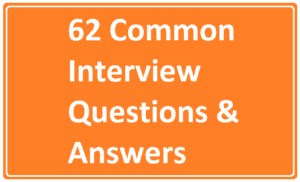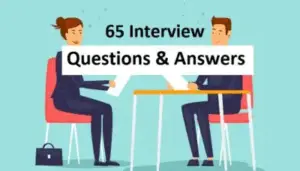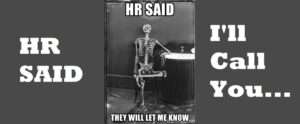Teach you how to cleverly answer the three questions of the interview and answer them skillfully. When applying for a job, HR values personal ability the most. Knowing interpersonal communication is also a magic weapon for success in the workplace. Things in the workplace are never simple and can be summarized. Actively maintain interpersonal relationships in the workplace, Xiaobian will teach you how to skillfully answer the three questions of the interview.
Teach you how to cleverly answer the three questions of the interview 1
Q1. What is your expected salary?
There may be many reasons why everyone chooses to work, but the purpose of work is ultimately for money. Therefore, in the application process, every interviewee cannot avoid a question from HR: “What is your expected salary?”
Some people think too much of themselves, speak out loudly and directly persuade HR to quit; there are also some people who promise to be slaughtered by the company, and when they go to work, they can’t help but want to kick themselves when they come back to work; and some people feel that the salary package Isn’t it clearly written on the recruitment notice, so is it necessary to talk about it?
In fact, it is necessary, not only because negotiating salary is a necessary part of a job search, but also because negotiating salary can properly demonstrate your ability and make the company recognize you more.
Therefore, when discussing salary, we must pay attention to the following three points:
1. Find out about the average salary in the industry
Before entering this industry, you need to understand the market of this industry and determine the reference range of salary treatment.
For specific operations, you can refer to the market price and bottom-line price proposed by Mr. Tang Junjian in his workplace class.
The so-called market price needs to be understood by multiple parties before making a judgment. You can go to the recruitment platform to learn about the price ranges set by multiple companies in the same industry, or you can ask the seniors and sisters who are already working about the current situation of the industry. Only by knowing yourself and others can you talk about an ideal salary.
No bottom line price means that when the other party offers this price, you can accept it without hesitation.
And your best-predetermined range for salary is between market price and no bottom line price.
2. Show your worth
In the workplace, your salary is entirely determined by the revenue you generate for the company. So when it comes to salary, all you have to do is let HR see your value.
If you have some previous work experience, then you can talk about what you have learned in this job, whether independently responsible or fully involved in those projects, and what value has been created for the previous company.
If you are a fresh graduate, then you can talk about the activities you have organized or participated in in the school to reflect your organizational and collaborative skills, which can also greatly enhance your value in the eyes of HR.
3. “It doesn’t matter if it’s money or not”
During an interview, remember not to say this. Even if you really don’t care about salary, don’t say that, because it’s likely to discourage HR from hiring you.
Generally, when a job seeker says this sentence, HR will subconsciously think that this person does not have a clear understanding of himself and a reasonable position, nor does he have any career plans and pursuits, and he is here entirely for the purpose of “getting to eat.” of”.
For a job seeker with such a salted fish attitude, if you were HR, how would you decide? The answer speaks for itself.

Q2. What are your hobbies?
What are your usual hobbies? It sounds like a very common question, and it seems that HR only has words in order to shorten the distance with job seekers. In fact, it is not. Many job seekers are eliminated because of their coping with this question.
Because HR is behind this question, to understand the character of job seekers. Therefore, you must not say some favorite things in the eyes of the public.
Also, let alone say that you have no hobbies. If you have no hobbies and your spare time is monotonous, HR will judge that your personality structure may be just as pale and uninteresting.
Also Read:- Typical Interview Questions and Answers
1. Hobbies should be related to work
To answer this question first, or to return to the purpose of the HR interview. As buyers of labor, they want to hire people who are perfect and fit their business.
If the hobbies you answered are work-related and beneficial to the work, then you will definitely get extra points in the eyes of HR.
For example, if you are applying for a new media editorial position, if your hobbies are “reading”, “photography”, and “scanning Weibo”, this is undoubtedly of direct value to your work content:
Because of the love of reading, it shows that the knowledge is broad and deep; “photography” is directly beneficial to typesetting, drawing, and short video;
2. Learn more about your “hobbies”
For these interview-ready “hobbies,” you’ll also need to do some in-depth preparation.
Because the interviewer is sitting here to interview you, the knowledge and the world you have seen must be more than you. If the interviewer is interested in your hobbies and asks further questions, then you should also be prepared and be able to speak concisely. Express your own opinions, let the interviewer feel that it is not a false boast, and truly give yourself extra points.
Q3. Reasons for leaving your company
For some job-hopping job seekers, the reason for leaving is an unavoidable question. Some people feel that it is not easy to say the reason for leaving, but it is enough to tell the truth. But if you do, there’s a good chance you’ll be knocked out.
Many people don’t know that when HR asks you why you changed jobs, there are actually many subtexts. For example, what is your personality like, are you easy to get along with, and are you suitable for this job…
1. Reasons not to say
For many people, being wrong in the workplace is one of the most important reasons for changing jobs. However, in the interview, the grievance is the least mentioned thing, and negative comments on the previous company are even more taboo in the interview.
Not having a job is not hard work, but when looking for a job, you must not be distressed or tired. The reason is actually very simple. No matter how considerate the boss is for the hard work of the employees, he will not find someone who seems to have a poor ability to withstand pressure. After all, no one can guarantee that there will be problems in future work.
At the same time, complaining that the last job was boring and that you didn’t like it was also a taboo in the interview. You must know that you don’t like or have no interest. This subjective evaluation usually means that you don’t know what you want and lack a clear career plan.
Also Read:- 16 Difficult Interview Questions and Answers
2. Why HR likes to listen
“Personal career development bottlenecks.” Every employer wants the employees they hire to have a long-term plan.
The most outstanding ones are often those with a clear career planning path. There are many reasons for personal career development bottlenecks. Sometimes, bad words may make people feel that you have high self-esteem, so when you emphasize personal career development bottlenecks, you can Start from the lack of further improvement in ability, rather than just take your own promotion failure as an example.
“The company or industry is not developing well.” This is usually an objective reason that cannot be changed. A person has stayed in the company for a long time, but resigning because the company is developing slowly, or even because he is not optimistic about an industry, is a safe resignation. reason. After all, everyone knows that in a company with no development prospects, no matter how hard the employees work, it will be in vain.

Teach you how to cleverly answer the three questions of the interview 2
1. Could you please introduce yourself?
Answer tip: It is too common for most people to answer this question. They only say their name, age, hobbies, and work experience, which are all on their resumes. In fact, what companies most want to know is whether the candidate is competent for the job, including the strongest skills, the most in-depth knowledge areas, the most positive parts of the personality, the most successful things you have done, the main achievements, etc., All of these can be unrelated to learning, or related to learning, but only companies will believe if they have to highlight their positive personality and ability to do things. Companies attach great importance to a person’s courtesy, job seekers should respect the examiner and say “thank you” after answering each question. Companies like polite job applicants.
2. What do you think is the greatest strength of your personality?
Answering tips: Calm, organized, determined, tenacious, helpful and caring, adaptable and humorous, optimistic and friendly. After one to two years of training and project practice at Beida Jade Bird, plus the internship, I am suitable for this job.
3. Tell me about your biggest weakness?
Answer Tip: This question is very likely to be asked by companies. Usually, they do not want to hear the shortcomings of direct answers. If job seekers say that they are cautious, jealous, very lazy, have a big temper, and have low work efficiency, the company will definitely not hire them. Never smartly answer “My biggest flaw is too much pursuit of perfection”. Some people think that answering this will make them look better, but in fact, they are already in danger. Enterprises like job seekers start from their own advantages, add some small disadvantages in the middle, and finally turn the problem back to advantages, highlighting the advantages, of enterprises like smart job applicants.
Also Read:- Guide to Fresh Graduates Maintaining Mental Health During the Job Search
4. What is your salary requirement?
Answer tip: If your salary requirements are too low, it obviously degrades your ability; if your salary requirements are too high, it will appear that you are too heavy and the company cannot afford it. Some employers usually budget for the position they are applying for in advance, so their first offer is often the highest price they can give. interest in work.
Answer sample 1: I have no hard salary requirements, and I believe your company will be friendly and reasonable in handling my problem. My focus is on finding the right job opportunity, so as long as the conditions are fair, I don’t care too much.
Answer sample 2: I have been trained in systematic software programming, do not need a lot of training, and I am particularly interested in programming. Therefore, I hope that the company can pay me a reasonable salary according to my situation and the level of market standards.
Answer sample 3: If you have to say the exact number yourself, please don’t say a broad range, then you will only get the minimum number. It’s best to give a specific number that shows you’ve done your research on today’s talent market and know the value of an employee with a degree like yours.
5. What is your opinion on overtime?
Answer tip: In fact, many companies ask this question, not to prove that you must work overtime, but to test whether you are willing to contribute to the company.
Answer sample: If the job requires me to work overtime, I am single now and have no family burden, so I can devote myself to my work. But at the same time, I will also improve work efficiency and reduce unnecessary overtime.
6. If we hire you through this interview, but you work for a period of time and find that you are not suitable for this position at all, what should you do?
Answer Tip: After a period of time, I found that the job is not suitable for me. There are two situations:
① If you really love this profession, then you must keep learning, learn business knowledge and experience from leaders and colleagues with an open mind, and understand the spiritual connotation and Occupational requirements, striving to reduce the gap;
② If you think this career is optional, then you should change your career as soon as possible to find a career that suits you and that you love so that your development prospects will be bigger, which is good for the unit and the individual.

7. Talk about your opinion on job-hopping?
Answer tips:
① Normal “job-hopping” can promote the rational flow of talents and should be supported.
② Frequent job-hopping is unfavourable to both the unit and the individual and should be opposed.
8. It is difficult to get along with colleagues and bosses at work, what should you do?
Answer prompt:
①I will obey the command of the leader and cooperate with the work of my colleagues.
②I will find the reasons for myself, and carefully analyze whether my poor work makes the leaders dissatisfied, and my colleagues are not used to it. I also need to see if I am not doing a good job in dealing with people. If so, I will try to correct it.
③If I can’t find the reason, I will find an opportunity to communicate with them and ask them to point out my shortcomings and correct them in time.
④As an excellent employee, you should always focus on the overall situation. Even if the leaders and colleagues do not understand me for a period of time, I will do my job well and learn from them humbly. I believe that they will see that I am working hard. One day you will smile at me.
9. How much do you know about our company?
Answer Tip: Check the company’s main business online before going to the company for an interview. For example, Your company intends to change its strategy, strengthen OEM cooperation with foreign manufacturers, and use overseas distributors for its own brands.
10. What are the three words that best describe yourself?
Answer promptly: The three words I often use are: strong adaptability, responsible and consistency in doing things, and explaining to the examiner with specific examples.





























